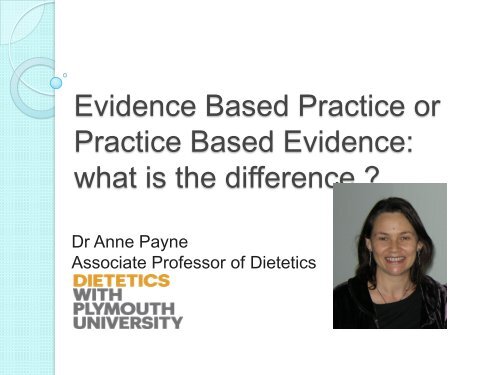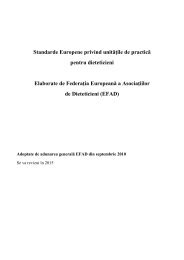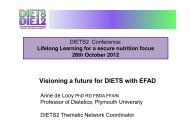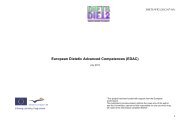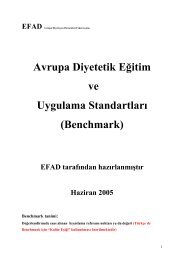Evidence Based Practice or Practice Based Evidence what is the ...
Evidence Based Practice or Practice Based Evidence what is the ...
Evidence Based Practice or Practice Based Evidence what is the ...
Create successful ePaper yourself
Turn your PDF publications into a flip-book with our unique Google optimized e-Paper software.
<strong>Evidence</strong> <strong>Based</strong> <strong>Practice</strong> <strong>or</strong><br />
<strong>Practice</strong> <strong>Based</strong> <strong>Evidence</strong>:<br />
<strong>what</strong> <strong>is</strong> <strong>the</strong> difference ?<br />
Dr Anne Payne<br />
Associate Profess<strong>or</strong> of Dietetics
Overview<br />
1. What <strong>is</strong> <strong>Evidence</strong> <strong>Based</strong> <strong>Practice</strong><br />
(EBP)?<br />
2. What <strong>is</strong> <strong>Practice</strong> <strong>Based</strong> <strong>Evidence</strong> .. a<br />
practitioners view?<br />
3. Current view and critique of <strong>the</strong> EBP<br />
model.<br />
4. What next…..how do we change<br />
practice?<br />
5. Conclusions
<strong>Evidence</strong>-based <strong>Practice</strong> (EBP)<br />
What <strong>is</strong> it?<br />
“............<strong>the</strong> conscientious, explicit<br />
and judicious use of current best<br />
evidence in making dec<strong>is</strong>ions<br />
about <strong>the</strong> care of individual<br />
patients”<br />
(Sackett et al 1996)
EBP – Why do we need EBP?<br />
• EBP helps patients and<br />
practitoner’s to make<br />
inf<strong>or</strong>med dec<strong>is</strong>ions about<br />
health-care and so<br />
promotes better quality<br />
care.<br />
• EBP helps healthcare<br />
providers to understand <strong>the</strong><br />
effectiveness, and<br />
comparative effectiveness<br />
of different types of care to<br />
ensure best use of<br />
resources.
EBP – Why?<br />
In essence we are asking………<br />
‘Is <strong>the</strong> right person<br />
doing <strong>the</strong> right thing,<br />
at <strong>the</strong> right time, in<br />
<strong>the</strong> right place in <strong>the</strong><br />
right way, with <strong>the</strong><br />
right result ?’
<strong>Evidence</strong> Triad – Fundamental Principles of EBP<br />
Adapted from: Sackett DL, Rosenberg MC, Gray JA, Haynes RB,<br />
Richardson WS. <strong>Evidence</strong> based medicine: <strong>what</strong> it <strong>is</strong> and <strong>what</strong> it <strong>is</strong>n't.<br />
BMJ. 1996;312: 71-72.
<strong>Evidence</strong> <strong>Based</strong> <strong>Practice</strong>….<br />
• Integrates best available external<br />
clinical evidence from systematic<br />
research ……with<br />
• <strong>Practice</strong> <strong>Based</strong> <strong>Evidence</strong>/ Individual<br />
clinical expert<strong>is</strong>e …..while<br />
• Taking into account patient<br />
preferences/values
The 5 stages of EBP<br />
1. F<strong>or</strong>mulate a clinical question: eg<br />
use of <strong>the</strong> PICO f<strong>or</strong>mat<br />
(Population Intervention<br />
Compar<strong>is</strong>on Outcome)<br />
2. Search f<strong>or</strong> relevant evidence:<br />
define a research strategy and key<br />
w<strong>or</strong>ds<br />
3. Critical appra<strong>is</strong>al /Evaluation of <strong>the</strong><br />
evidence f<strong>or</strong> validity and<br />
usefulness to identify best practice<br />
4. Implement change: your Action<br />
Plan<br />
1. Audit <strong>the</strong> impact of change
Hierarchies of <strong>Evidence</strong><br />
1. Systematic reviews (including<br />
meta-analyses)<br />
2. Random<strong>is</strong>ed Controlled Trials &<br />
o<strong>the</strong>r experimental research<br />
3. Non-experimental research e.g.<br />
surveys, qualitative research<br />
4. Conference & seminar rep<strong>or</strong>ts,<br />
examples of good practice<br />
5. Expert opinion
The research evidence: key tools<br />
•Systematic reviews &<br />
meta analys<strong>is</strong>:<br />
– eg. The Cochrane<br />
Collab<strong>or</strong>ation<br />
•Clinical guidelines<br />
– eg. SIGN and NICE
Patient<br />
Clinical Rec<strong>or</strong>ds<br />
Patient<br />
preference<br />
& needs<br />
Ethical Principles<br />
&<br />
Professional<br />
Codes<br />
Research<br />
&<br />
Systematic<br />
review<br />
Audit<br />
&<br />
Evaluation<br />
of change<br />
EBP<br />
inf<strong>or</strong>med<br />
clinical dec<strong>is</strong>ion<br />
making<br />
Clinical<br />
Guidelines<br />
(in UK NICE/SIGN)<br />
NSFs<br />
<strong>Practice</strong> <strong>Based</strong><br />
<strong>Evidence</strong>:<br />
clinical<br />
judgement<br />
& expert<strong>is</strong>e<br />
Care Pathways
<strong>Practice</strong> <strong>Based</strong> <strong>Evidence</strong>:<br />
<strong>the</strong> practitioners expert<strong>is</strong>e…<br />
Defined by Sackett et al as:<br />
‘<strong>the</strong> ability to use our clinical skills & past<br />
experience to rapidly identify each patient’s<br />
unique health state & diagnos<strong>is</strong>, <strong>the</strong>ir<br />
individual r<strong>is</strong>ks & benefits of potential<br />
interventions, & <strong>the</strong>ir personal values &<br />
expectations.’
<strong>Practice</strong> <strong>Based</strong> <strong>Evidence</strong><br />
<strong>Practice</strong> <strong>Based</strong> <strong>Evidence</strong> can take many<br />
f<strong>or</strong>ms:<br />
•personal experience and <strong>the</strong><strong>or</strong>etical<br />
knowledge<br />
•reflective practice (practitioner derived<br />
knowledge)<br />
•audit evaluation of practice and practice<br />
based research.
Personal experience and knowledge<br />
F<strong>or</strong> example:<br />
•University education<br />
•Diversity of clinical<br />
experience<br />
•Continuing<br />
Professional<br />
Development (CPD)
Reflective practice<br />
Reflection on practice:<br />
•A powerful clinical tool<br />
to inf<strong>or</strong>m and enhance<br />
our clinical practice. It <strong>is</strong><br />
a key tool in our undergraduate<br />
programmes<br />
•Gibbs reflective cycle <strong>is</strong><br />
a popular model, as<br />
pictured.
Reflection in practice<br />
• Dynamic process:<br />
sound communication skills<br />
• Immediate<br />
outcome<br />
• Inf<strong>or</strong>ms dec<strong>is</strong>ion<br />
making process<br />
• Requires<br />
experience and<br />
confidence
<strong>Practice</strong> based research and<br />
audit<br />
• Clinical audit:<br />
<strong>the</strong> audit cycle <strong>is</strong> a key<br />
component of effective<br />
evidence based practice<br />
• Clinical research:<br />
The identification of<br />
appropriate clinical<br />
outcome measures<br />
/criteria <strong>is</strong> now recogn<strong>is</strong>ed<br />
as essential to assess <strong>the</strong><br />
effectiveness of clinical<br />
care, whe<strong>the</strong>r by audit <strong>or</strong><br />
<strong>or</strong>iginal research (BDA<br />
2011)
Critique of EBP<br />
• Too focused on research<br />
evidence: Systematic Reviews<br />
and RCT’s<br />
• Patient needs not adequately<br />
addressed (each <strong>is</strong> unique)<br />
• Does not take adequate<br />
account of Clinical Expert<strong>is</strong>e<br />
• Should we use <strong>the</strong> term<br />
<strong>Evidence</strong> Inf<strong>or</strong>med <strong>Practice</strong><br />
‘EIP’ ra<strong>the</strong>r han EBP ?? (Nevo &<br />
Slonim-Nevo (2011)
What next....how do we change practice?<br />
Having identified best practice how do<br />
we now change practice?<br />
What are <strong>the</strong> barriers to change? Are <strong>the</strong>y personal<br />
<strong>or</strong> institutional and how can we overcome <strong>the</strong>se?<br />
What are <strong>the</strong> key steps to implement change?<br />
Are dietitians being taught EBP in University <strong>or</strong> ‘on<br />
<strong>the</strong> job’ as CPD? Do we need to learn new skills?
Personal barriers to change<br />
• Time to read<br />
<strong>or</strong>iginal research<br />
papers<br />
• Time to do<br />
research and audit<br />
• Knowledge of <strong>the</strong><br />
EBP process<br />
• Confidence in <strong>the</strong><br />
interpretation of<br />
stat<strong>is</strong>tics<br />
• Reference: Heiwe S et al (2011)
Individual barriers…do you<br />
recogn<strong>is</strong>e th<strong>is</strong> person………..<br />
• Continues to w<strong>or</strong>k only with<br />
knowledge gained when<br />
qualified<br />
• Uses of out of date textbooks<br />
• Is not aware of new research<br />
• W<strong>or</strong>ks in <strong>is</strong>olation from<br />
interested colleagues<br />
• Does not see value of EBP to<br />
clinical practice<br />
• Feels threatened by change
Institutional barriers to<br />
change….<br />
• Lack of auth<strong>or</strong>ity to make changes to<br />
ex<strong>is</strong>ting policy<br />
• Lack of resources and budgets<br />
• Lack of co-operation from o<strong>the</strong>rs e.g. <strong>the</strong><br />
Multi-d<strong>is</strong>ciplinary Team<br />
• Lack of time to implement<br />
<strong>the</strong> change & train staff
How do we overcome barriers?<br />
• Team leader with<br />
sound knowledge of<br />
relevant evidence<br />
base<br />
• Academic supp<strong>or</strong>t<br />
• Multid<strong>is</strong>ciplinary<br />
w<strong>or</strong>king groups<br />
• Developing research<br />
culture.<br />
• Training in management<br />
and leadership to<br />
implement change<br />
• Managerial supp<strong>or</strong>t<br />
• Dedicated time out f<strong>or</strong><br />
study
Helpful levers f<strong>or</strong> change.........<br />
• The ‘Expert Patient’ can prompt <strong>the</strong><br />
most res<strong>is</strong>tant practitioner to update<br />
<strong>the</strong>ir practice<br />
• Opinion leaders and clinical<br />
champions can ra<strong>is</strong>e awareness of<br />
<strong>the</strong> need f<strong>or</strong> change in practice<br />
• Public opinion can influence health<br />
policy<br />
• EBP requires <strong>or</strong>gan<strong>is</strong>ational<br />
commitment
Key Steps<br />
to Implementing Change<br />
Analyse <strong>the</strong> change required to identify a strategy……<br />
1. Identify <strong>the</strong> key elements of change…..<br />
◦ Do you plan to introduce a new assessment tool<br />
◦ A new care-pathway<br />
◦ A novel nutritional supplement?<br />
2. Identify <strong>the</strong> economic, material and staffing<br />
resources required to implement change.<br />
3. Identify key stakeholders………..
Key Stakeholders?<br />
• Fellow professionals<br />
e.g. MDT<br />
• Boss/Line Manager<br />
• Media<br />
• Research funders<br />
• Health service<br />
management<br />
• Direct<strong>or</strong> of research<br />
• Policy makers<br />
• Patients
Key Steps<br />
to Implementing Change<br />
1. Assess whe<strong>the</strong>r key stakeholders &<br />
individuals are prepared f<strong>or</strong> change<br />
Identification of potential barriers to<br />
change<br />
Identification of enabling fact<strong>or</strong>s e.g.<br />
clinical champions<br />
2. Set an time-limited Action Plan f<strong>or</strong> change<br />
3. Evalute <strong>the</strong> impact of change via <strong>the</strong> audit cycle
Do dietitian’s need to learn new skills?<br />
The key skills to be an effective practitioner of<br />
EBP are:<br />
oComprehension of <strong>the</strong> EBP process<br />
oKnowledge of audit and research methodology,<br />
including <strong>the</strong> interpretation of stat<strong>is</strong>tics<br />
oUse of reflection in clinical practice<br />
oWell developed client communication skills to<br />
ensure that <strong>the</strong> patients view <strong>is</strong> heard.<br />
oWell developed team communication skills<br />
and presentation skills to implement<br />
change……
Conclusion<br />
<strong>Evidence</strong> <strong>Based</strong> <strong>Practice</strong> and <strong>Practice</strong> <strong>Based</strong><br />
<strong>Evidence</strong>:<br />
<strong>what</strong> <strong>is</strong> <strong>the</strong> difference??<br />
In my view <strong>the</strong> maj<strong>or</strong>ity of our clinical practitioners are w<strong>or</strong>king<br />
to implement ‘Best <strong>Practice</strong>’ via PBE and so are already<br />
engaged in <strong>the</strong> ‘EBP’ process, even if <strong>the</strong>y are not fully aware of<br />
it.<br />
They need to recogn<strong>is</strong>e <strong>the</strong>ir skills, abilities and achievements<br />
and strive to build a strong EBP culture in <strong>the</strong>ir w<strong>or</strong>kplace.<br />
New tools are being developed to help us do it even better and<br />
th<strong>is</strong> <strong>is</strong> <strong>the</strong> subject of th<strong>is</strong> afternoons presentations on <strong>the</strong> PEN<br />
tool.
References<br />
• Brit<strong>is</strong>h Dietetic Association (2011) Model f<strong>or</strong> Dietetic Outcomes.<br />
Birmingham, UK.<br />
• Craig JV and Symth RL (2007) The <strong>Evidence</strong>-<strong>Based</strong> <strong>Practice</strong> Manual<br />
f<strong>or</strong> Nurses (2 nd edition); Churchill Livingstone, Elsevier, UK.<br />
• Heiwe S et a (2011) <strong>Evidence</strong> <strong>Based</strong> <strong>Practice</strong>: attitudes, knowledge<br />
and behaviour among allied health care professionals. Int J f<strong>or</strong> Quality<br />
in Health Care; 23(2): 198-209<br />
• Livingston EH and McNutt RA (2011) The hazards of evidence-based<br />
medicine – assessing variation in care. JAMA; 306 (7): 762-763.<br />
• Nevo I and Slonim-Nevo E (2011) The myth of evidence-based<br />
practice: towards evidence inf<strong>or</strong>med practice. B J Social W<strong>or</strong>k; 1-22.<br />
• Pal<strong>is</strong>ano RJ (2011) <strong>Practice</strong> Knowledge: <strong>the</strong> f<strong>or</strong>gotten aspect of EBP.<br />
Physical and Occupational Therapy in Pediatrics 30(4) 261-263<br />
• Payne A and Barker H (eds) (2010) Advancing Dietetics and Clinical<br />
Nutrition; Churchill Livingstone, Elsevier, UK.<br />
• Sackett DL, Rosenberg MC, Gray JA, Haynes RB, Richardson WS<br />
(1996) <strong>Evidence</strong> based medicine: <strong>what</strong> it <strong>is</strong> and <strong>what</strong> it <strong>is</strong>n't. BMJ; 312:<br />
71-72.


